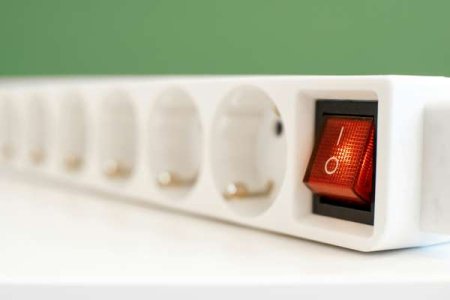Stop! Plugging these 7 things into your power strip could be dangerous!
By
Aubrey Razon
- Replies 0
As we embrace our golden years, our homes should be safe havens, but hidden dangers may be lurking in plain sight.
One unsuspecting threat? The common extension cord or power strip that many of us take for granted.
Discover why plugging in certain appliances could lead to serious consequences—your safety depends on it!
Extension cords and power strips are common household items, but they're not a one-size-fits-all solution.
Paul Martinez, a seasoned electrician and owner of Electrified NYC, cautions that not all cords are created equal.
For instance, a 14-gauge extension cord can typically handle up to 1,800 watts—equivalent to a standard wall outlet.
However, pushing these cords beyond their limits with high-wattage appliances can lead to overheating and, in the worst cases, fires.
Here are seven appliances that should always be plugged directly into a wall outlet:
1. Air Fryers: Culinary Convenience with a Catch
Air fryers have revolutionized quick and healthy cooking, but they're also power-hungry devices. Some models can draw up to 2,000 watts.
To avoid the risk of fire, it's best to use these appliances where they can be plugged directly into a wall outlet.
2. Microwaves: The Hidden Hefty Load
Microwaves are a kitchen staple, but they're also heavy-duty appliances that require their own dedicated circuit.
Plugging them into an extension cord can lead to overheating and potential hazards.
3. Refrigerators: The Constant Companions
Refrigerators may run on lower wattage, but because they operate continuously, they should never be connected to an extension cord.
Doing so could not only pose a fire risk but also cause your fridge to malfunction.
4. Toasters and Toaster Ovens: Small but Mighty
Don't let their size fool you; toasters and toaster ovens pack a punch when it comes to energy consumption.
With wattages that can reach up to 1,400, these appliances should have a direct line to a wall outlet to prevent fire risks.
5. Extension Cords: The Daisy Chain Danger
“Daisy chaining,” or plugging extension cords into each other, is a recipe for disaster. This practice can cause circuits to overheat and increase the risk of fire.
6. Space Heaters: Cozy but Combustible
Portable space heaters are notorious for being involved in home fires.
The Consumer Product Safety Commission estimates that they were linked to 1,700 fires annually between 2017 and 2019. Always plug heaters directly into a wall outlet to avoid overheating.
7. AC Units: Cool Comfort Requires Caution
Air conditioning units are power-intensive and should be connected to a wall outlet.
Moreover, choosing the right size AC for your space is crucial to prevent overworking the unit, which can lead to higher energy bills and, if improperly powered, fires.
The message from experts like Martinez is clear: no appliances should ever be plugged into extension cords or power strips.
These devices are designed for electronics, not appliances that draw high levels of power.
Always check the wattage and amperage of your appliances and ensure they're connected to an appropriate power source.
By being mindful of how we use extension cords and power strips, we can prevent accidents and protect our cherished spaces. Here are some things we can do to ensure our safety:
1. Audit Your Appliances: Identify which ones are currently plugged into extension cords or power strips.
2. Make Necessary Changes: Relocate appliances to be near wall outlets or consider hiring a professional to install additional outlets where needed.
3. Educate Your Circle: Share this information with friends and family to spread awareness about electrical safety.
Remember, a little precaution goes a long way. By plugging into the right habits, we can keep our homes—and ourselves—safe from electrical hazards.

Have you ever experienced an electrical scare? Do you have tips for managing appliance placement without resorting to extension cords? Share your stories and advice in the comments below. Let's empower each other to create safer living environments.
One unsuspecting threat? The common extension cord or power strip that many of us take for granted.
Discover why plugging in certain appliances could lead to serious consequences—your safety depends on it!
Extension cords and power strips are common household items, but they're not a one-size-fits-all solution.
Paul Martinez, a seasoned electrician and owner of Electrified NYC, cautions that not all cords are created equal.
For instance, a 14-gauge extension cord can typically handle up to 1,800 watts—equivalent to a standard wall outlet.
However, pushing these cords beyond their limits with high-wattage appliances can lead to overheating and, in the worst cases, fires.
Here are seven appliances that should always be plugged directly into a wall outlet:
1. Air Fryers: Culinary Convenience with a Catch
Air fryers have revolutionized quick and healthy cooking, but they're also power-hungry devices. Some models can draw up to 2,000 watts.
To avoid the risk of fire, it's best to use these appliances where they can be plugged directly into a wall outlet.
2. Microwaves: The Hidden Hefty Load
Microwaves are a kitchen staple, but they're also heavy-duty appliances that require their own dedicated circuit.
Plugging them into an extension cord can lead to overheating and potential hazards.
3. Refrigerators: The Constant Companions
Refrigerators may run on lower wattage, but because they operate continuously, they should never be connected to an extension cord.
Doing so could not only pose a fire risk but also cause your fridge to malfunction.
4. Toasters and Toaster Ovens: Small but Mighty
Don't let their size fool you; toasters and toaster ovens pack a punch when it comes to energy consumption.
With wattages that can reach up to 1,400, these appliances should have a direct line to a wall outlet to prevent fire risks.
5. Extension Cords: The Daisy Chain Danger
“Daisy chaining,” or plugging extension cords into each other, is a recipe for disaster. This practice can cause circuits to overheat and increase the risk of fire.
6. Space Heaters: Cozy but Combustible
Portable space heaters are notorious for being involved in home fires.
The Consumer Product Safety Commission estimates that they were linked to 1,700 fires annually between 2017 and 2019. Always plug heaters directly into a wall outlet to avoid overheating.
7. AC Units: Cool Comfort Requires Caution
Air conditioning units are power-intensive and should be connected to a wall outlet.
Moreover, choosing the right size AC for your space is crucial to prevent overworking the unit, which can lead to higher energy bills and, if improperly powered, fires.
The message from experts like Martinez is clear: no appliances should ever be plugged into extension cords or power strips.
These devices are designed for electronics, not appliances that draw high levels of power.
Always check the wattage and amperage of your appliances and ensure they're connected to an appropriate power source.
By being mindful of how we use extension cords and power strips, we can prevent accidents and protect our cherished spaces. Here are some things we can do to ensure our safety:
1. Audit Your Appliances: Identify which ones are currently plugged into extension cords or power strips.
2. Make Necessary Changes: Relocate appliances to be near wall outlets or consider hiring a professional to install additional outlets where needed.
3. Educate Your Circle: Share this information with friends and family to spread awareness about electrical safety.
Remember, a little precaution goes a long way. By plugging into the right habits, we can keep our homes—and ourselves—safe from electrical hazards.
Key Takeaways
- It's advised not to use an extension cord or power strip for high-wattage appliances as they can pose a fire hazard.
- Appliances including air fryers, microwaves, refrigerators, toaster ovens, and AC units should be plugged directly into a wall outlet and not on extension cords.
- The practice of daisy chaining, or plugging extension cords into other extension cords, leads to overheating and is strongly discouraged.
- Electrician Paul Martinez emphasizes that high-wattage appliances should be on dedicated circuits and extension cords should only be used for electronics.
Last edited:







